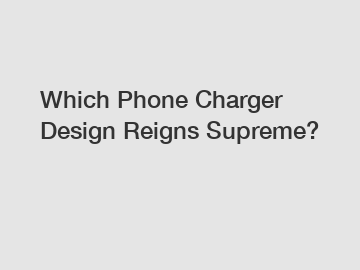Which Phone Charger Design Reigns Supreme?
In today's digital world, smartphones have become an integral part of our lives, allowing us to stay connected, informed, and entertained. However, the efficiency and convenience of these devices depend heavily on the type of charger we use. With numerous phone charger designs flooding the market, it can be overwhelming to determine which one reigns supreme. In this blog post, we will explore different charger designs and examine their pros and cons. So, let's dive in and find the ultimate phone charger that offers the best charging experience!
Wired Chargers:
Wired chargers have long been the norm when it comes to charging our smartphones. They usually consist of a USB connector on one end, which plugs into a power source, and a charging port on the other end, suitable for our phones. These chargers offer a reliable and stable connection, allowing for efficient charging.

Micro-USB Charger:
The micro-USB charger has a distinctive trapezoidal shape and has been a popular choice for many years. It is compatible with various devices, reflecting its widespread use. However, one downside to this design is the often-prevalent problem of cable tangling. Users often find themselves struggling with tangled cords, which can be quite frustrating.
USB Type-C Charger:
USB Type-C chargers have gained popularity due to their reversible design and ability to transfer data at high speeds. They provide faster charging capabilities, delivering more power to our smartphones. These chargers also have a longer lifespan and are more durable than their micro-USB counterparts.
Wireless Chargers:
Wireless chargers have boomed in popularity over recent years, offering a cable-free charging experience. They utilize electromagnetic fields to transfer energy from the charger pad to compatible devices. Wireless charging offers convenience and eliminates cable tangling issues. However, it's worth noting that this charging method is generally slower than wired alternatives.
Additional resources:Ultimate Guide to Waterproof LED Video Walls
Revolutionizing Events: How LED Displays Influence Audiences?
Ultimate Guide to Curved LED Screen Technology
Volcora Performance 80mm Thermal Receipt Printer USB/ ...
How to Ace an Energy Management Interview
What You Need To Know About Prepaid Meters
Lithium Batteries Buyer's Guide—Part 3, Current (Amps) ...
Inductive Charging:
Inductive charging is commonly used in wireless chargers and relies on a pad where users place their phones to initiate the charging process. This method requires precise alignment between the phone and the pad, which can be a minor inconvenience. Moreover, phones need to be in close proximity to the charging pad, limiting usability while using the device.
Resonant Charging:
Resonant charging, an advanced form of wireless charging, has gained traction due to its ability to charge multiple devices simultaneously. This method allows for charging devices even when they are slightly off-center, providing users with more flexibility and convenience. Resonant charging, however, has a relatively higher cost compared to other wireless charging options.
Conclusion:
With an array of charger designs available, it's necessary to consider various factors before deciding which one reigns supreme for your needs. Wired chargers, like the micro-USB and USB Type-C options, offer fast and reliable charging with different levels of durability. On the other hand, wireless chargers, such as inductive and resonant charging, provide convenience and freedom from tangled cables.
Ultimately, the choice between wired and wireless charging depends on personal preferences and lifestyle. If efficiency and quick charging are essential, then wired chargers may be your best bet. However, if convenience and a cable-free experience are top priorities, then wireless chargers may be the answer.
Regardless of the charger design, it is important to ensure that you purchase from reputable manufacturers to avoid potential damage to your device or risk of fire hazards. Always prioritize safety and quality when selecting your phone charger.
In the end, the reign of the supreme phone charger design is subjective and varies based on individual needs. Whichever charger you choose, ensure it meets your requirements for efficiency, durability, and convenience. Happy charging!
Want more information on phone charger manufacturer, smart electronics ltd, bulk portable charger? Feel free to contact us.
Additional resources:6 Best Solar Batteries (2024 Guide)
68
0
0

Comments
All Comments (0)